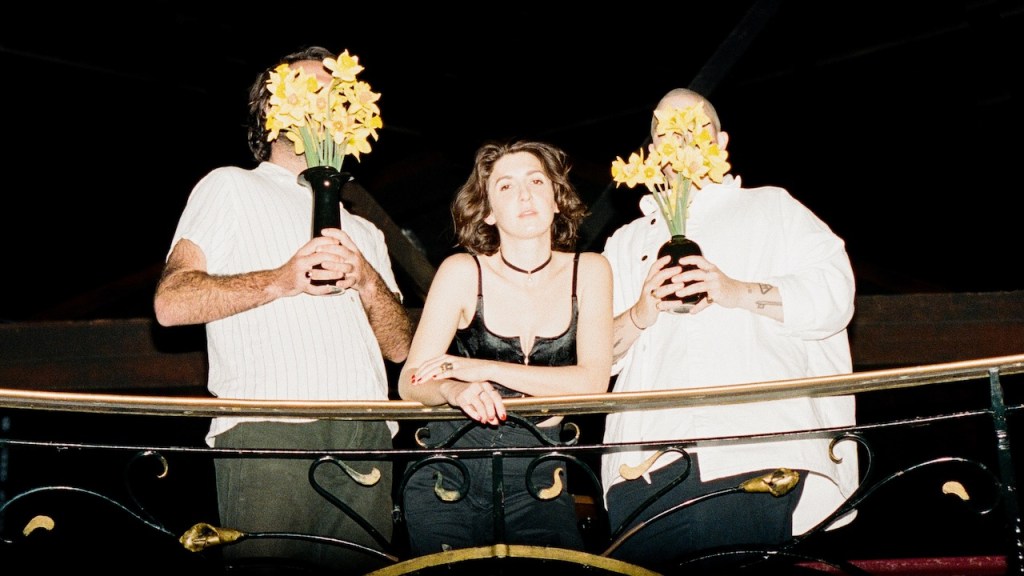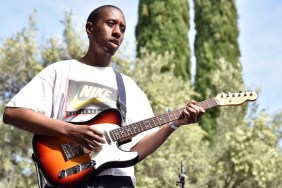Meanjin/Brisbane indie pop band Moreton released their latest single, ‘Glass’, in October 2022. Produced by Big Scary’s Tom Iansek, ‘Glass’ is a tense, piano-focused power ballad that navigates the emotional pain of a non-mutual separation.
The lyrics of vocalist and songwriter Georgia James Potter capture the impulsive thoughts that go along with feeling wistful and forlorn – “Is that the sound of your car? The sound of you turning in?” she asks – as well as the way one’s perception changes in periods of emotional instability – “Saturday nights move quickly on my own without you,” she sings.
Relative to the lyrics, the arrangement has a sober, restrained quality, but the song’s loaded emotional core gradually weighs down on the listener. Music Feeds spoke to Georgia James Potter about writing ‘Glass’, working with Iansek, and what to expect from Moreton’s upcoming The Dog Years EP.
Moreton – ‘Glass’
Music Feeds: Is there something specific about glass that corresponds to the emotional state you were trying to convey?
Georgia James Potter: It’s all of the things glass can be. Strong, fragile, sharp, dangerous, luminous, beautiful, heavy. And I kept having an internal conversation at the time about heartache versus heartbreak, and where the weight of that line balances when you’re navigating emotional pain.
MF: Did a lot of genuine, raw emotion go into writing ‘Glass’?
Georgia: It sure did, but my writing is always a blend of story and confession, memory and illusion. [‘Glass’ is about] the separation of a bond, the letting go of an idea you had about the present and the future, and accepting that a new version has arrived whether you like it or not – as painful and heavy and unfamiliar and thrilling and empowering as that can be.
MF: Did you do a lot of honing and editing to get the lyrics just right?
Georgia: I mostly think of myself as a poet who likes to sing, rather than a musician, so honing the narrative is my favourite part. I was writing ‘Glass’ at a new old piano I’d bought myself, a little cheap number from Marketplace. I put it in my bedroom, which overlooks the driveway.
At that time, as I fought for productive ways to manage heartache lest it turn to heartbreak, I started doing a lot of object writing. It’s an exercise that focuses on using only the physical senses to recount things, which is a universal way to talk to a listener, because we can all imagine with the senses.
So, while much if it was also free-flowing improvisation, which is another big part of my process, once I was getting into the minutiae of it, I used object writing to describe the scene – how they would never again appear in my driveway, which I could see from the piano.
MF: Did you think much about how you’d balance the level of intensity in the performance while also getting across the feeling in the lyrics?
Georgia: I think it’s something I’m still working on, performing in the studio, as singing live is really what’s native to me. But you can’t always bring that same intensity to the studio; the microphones don’t capture it, everything turns thin and shrill.
So I’ve been focusing a lot more on under-singing on the record, letting the lyrics do the work, and going hard at the shows. Tom Iansek does this so well with his records so he was inspiring to work with in that sense.
MF: Did Tom play a part in nailing down the arrangement?
Georgia: This was my first release playing piano and adding some synths. I’ve been a tiny bit nervous about revealing this side of our sound because piano and synths just don’t have the same kind of attitude that guitars do. They’re always going to be more slick and clean, which aren’t words I’m very comfortable with in relation to Moreton, but the piano sound is actually my main instrument.
We just went with what felt right, both in the demo and in the studio. My co-writer for the song, Caspia, actually brought a lot of the identity – the drone, the tambourine, and the piano waterfalling in the bridge. Then Tom is always a champion of keeping it simple. We tracked it live as a three piece – piano, bass, drums – then just a few synth layers for the back half that felt right. I have a lot of trust in the way Tom approaches sound.
MF: How does ‘Glass’ relate to the rest of The Dog Years EP? Is it a signal of the sound or mood of the record as a whole?
Georgia: I feel like ‘Glass’ sits nicely with ‘Count a Heart’ featuring Jordan Rakei, and one other, yet to be released piano driven track. And then the other released track from this EP, ‘Down & Out’, nods to the guitary half of the EP.
There’s a bit of permission with the EP format to kind of show your cards, all the sounds you can do, in a way that an album doesn’t lend itself to as much, in my opinion, because you don’t need to have this long thread running through everything. An EP is kind of a sonic aesthetic piece, rather than a concept. That being said, The Dog Years is definitely a concept I look forward to talking about closer to the record.
Moreton feat. Jordan Rakei – ‘Count a Heart’
Further Reading
Big Scary on ‘Me and You’: “There is Much Less Ego in This Band Than There Used to Be”
Katie Gregson-MacLeod: “I’m a Folk Singer-Songwriter First and Foremost”
Vera Blue: “You Have to Open Yourself Up or People Won’t Feel Anything”












